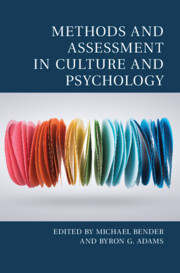Book contents
- Methods and Assessment in Culture and Psychology
- Culture and Psychology
- Methods and Assessment in Culture and Psychology
- Copyright page
- Dedication
- Additional material
- Contents
- Figures
- Tables
- Contributors
- Foreword
- 1 Introduction to Methods and Assessment in Culture and Psychology
- Part 1 Acculturation and Identity
- Part 2 Individual Differences across Cultures
- Part 3 Culture and Assessment
- 12 Psychological Assessment In and Over Time: Challenges of Assessing Psychological Constructs and Processes in Cultural Dynamics
- 13 Priming Culture(s): How Theories and Methods Inspire Each Other
- 14 The Evolution of Multigroup Comparison Testing across Culture: Past, Present, and Future Perspectives
- 15 How Far Can Measurement Be Culture-Free?
- Index
- References
13 - Priming Culture(s): How Theories and Methods Inspire Each Other
from Part 3 - Culture and Assessment
Published online by Cambridge University Press: 21 January 2021
- Methods and Assessment in Culture and Psychology
- Culture and Psychology
- Methods and Assessment in Culture and Psychology
- Copyright page
- Dedication
- Additional material
- Contents
- Figures
- Tables
- Contributors
- Foreword
- 1 Introduction to Methods and Assessment in Culture and Psychology
- Part 1 Acculturation and Identity
- Part 2 Individual Differences across Cultures
- Part 3 Culture and Assessment
- 12 Psychological Assessment In and Over Time: Challenges of Assessing Psychological Constructs and Processes in Cultural Dynamics
- 13 Priming Culture(s): How Theories and Methods Inspire Each Other
- 14 The Evolution of Multigroup Comparison Testing across Culture: Past, Present, and Future Perspectives
- 15 How Far Can Measurement Be Culture-Free?
- Index
- References
Summary
Scientifically significant phenomena inspire new theories and methods. In this chapter, we use research examples in multicultural psychology (Hong, Morris, Chiu & Benet-Martinez, 2000; Morris, Chiu, & Liu, 2015) to illustrate how cross-cultural phenomena (cultural frame-switching, psychological responses to cultural mixing) inspire new experimental methods in cross-cultural research (cultural priming, bicultural priming, experimental simulation of cultural mixing), which in turn motivate new perspectives to culture and psychology, and give psychology a stronger voice in important intellectual debates related to the cultural effects of globalization. As a result, the psychological science of culture is not limited to constructing abstract categorical representations of cultures from cross-cultural survey data and inferring cultural processes behind the closed doors of experimental laboratories. Instead, psychology is more prepared than ever to make major theoretical and methodological contributions to an expansive and inclusive social science of globalization.
Keywords
- Type
- Chapter
- Information
- Methods and Assessment in Culture and Psychology , pp. 271 - 295Publisher: Cambridge University PressPrint publication year: 2021

